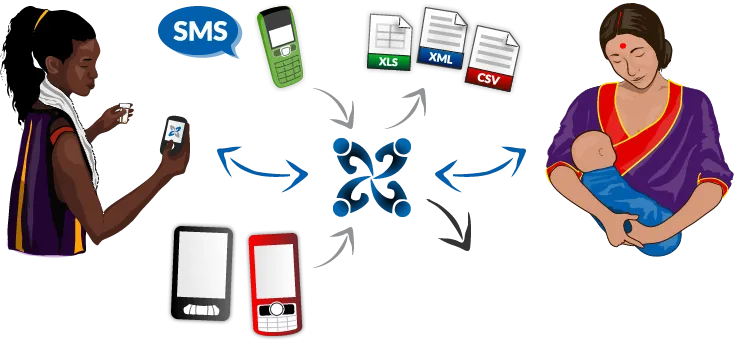[mSocial Venture] Dimagi: Schwab Foundation’s Social Entrepreneur 2012
Suman Devi is a community health worker in Uttar Pradesh, a state with one of the highest maternal mortality rates in India. Suman’s job requires her to travel to villages to counsel pregnant women in each of these villages about the necessary health measures to be taken during pregnancy. The only thing that Suman carries to help her do her work is a mobile phone. Her mobile phone unlike others has a CommCare (mobile-cloud based) platform installation as an aid to help her educate pregnant women.
This platform is image heavy and provides questions as voice cues to the pregnant women. They in turn answer those questions which are then recorded in the same device. This information is later fed into the computer to collate the data on all the pregnant women in every village with specific details regarding each of those pregnant women. This data further helps them provide the necessary health care to those women. The usage of text is minimal since the platform is primarily used by low literate population in the country.

Birth of Dimagi
In 2002, telecom service providers in India were still charging an arm and a leg for their services. Owning a mobile phone was a dream for any ordinary citizen in India. As for Jonathan Jackson and Dr. Vikram Sheel Kumar, the Founders of Dimagi, they began working on their mobile based platform, CommCare for community health workers way back in 2002. Dimagi arrived in India in 2010 when the CommCare – ASHA project was launched. Currently, Dimagi operates its CommCare platform with 15 different partners in 9 states across India. Today, Dimagi is present in 30 countries while CommCare projects are in operation in 25 countries around the world. Dimagi is also one of the Social Entrepreneurs 2012 Awardees announced by the Schwab Foundation for Social Entrepreneurship.
Mobile technology today has become a major development tool for international, national agencies and even governments. “Mobile is taking on a new innovation turn. When we started 10 years ago, this had not happened. It is no longer a technology issue but a system issue of how this technology can be used by the system. The main piece of innovation that has happened now is not at the technology level but at the system intervention level,” explains Jackson Jonathon, Co-founder, Dimagi.
Like other mobile based platforms that are used in developing countries, Dimagi also hit a road block addressing the challenge of low literate/illiterate users. Research was undertaken on the interaction levels and the interactions were studied in Afghanistan. According to Jonathan, when this learning was brought to India and given to the ASHA community, they were empowered with more authority over what they were doing.

Dimagi charges per user a monthly fee with most of their revenue being generated by building applications and supporting implementations for their partners. Dimagi currently has no dedicated sales or marketing team. All their marketing is on ground, inbound and word of mouth marketing.As for the secret of their success, Jonathan says, “We have had a product centric approach. Partners appreciated that. Technology has never been the only thing. It is always people, process and technology. We as a company are also working with people and the process. This approach was not followed by other enterprises even 3 years ago. But after all the pilot failures, people are actually buying into the idea of people, process and technology.” Dimagi is also doing research on performance management in India and Kenya to understand the real impact of their work.
Leveraging their success in mhealth, Dimagi is now foraying into agriculture and education as well. As one of the pioneers in this space, what does Dimagi think is going to be the future of mobile technologies? “We have seen a boom in mobile apps. I don’t know how this is going to play up but the kind of innovation that is going to happen in the next 5 to 10 years is going to be amazing, jumping from Nokia to smartphones. With the potentialities of the phones increasing, the potential to do more in the social space is also likely to change. There is definitely going to be a surge of innovations in the social space as well,” concludes Jonathan.
Want to know how CommCare works? Take a look at CommCare's website


![[mSocial Venture] Dimagi: Schwab Foundation’s Social Entrepreneur 2012](https://images.yourstory.com/cs/wordpress/2012/09/commcare.png?mode=crop&crop=faces&ar=16%3A9&format=auto&w=1920&q=75)




